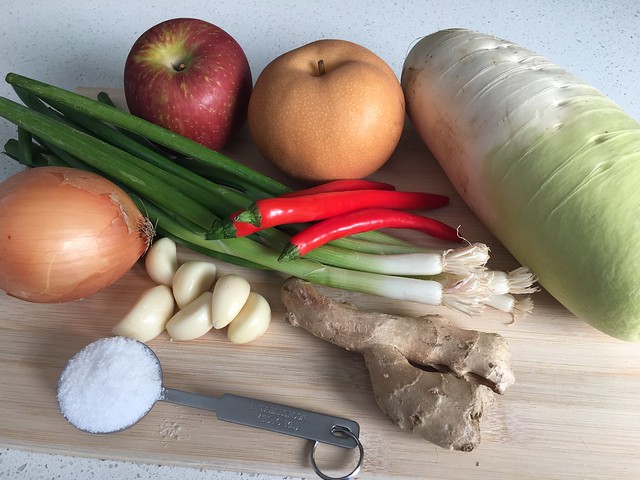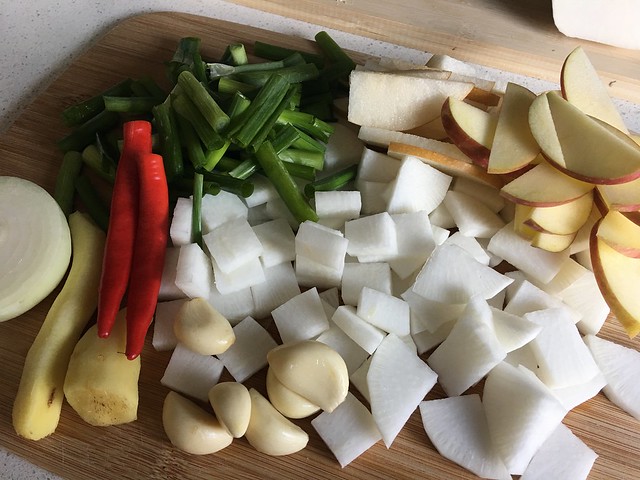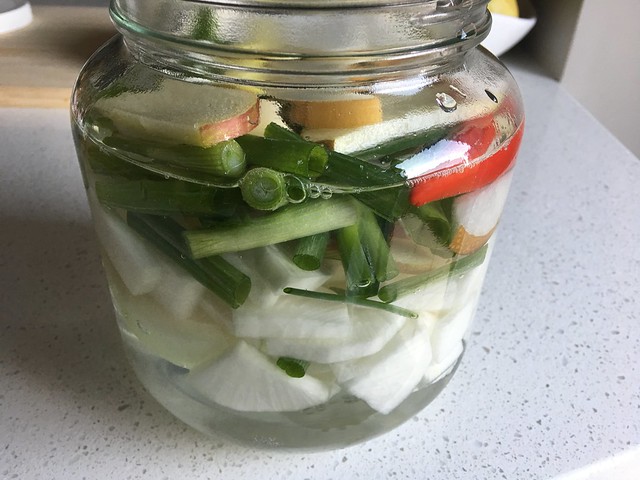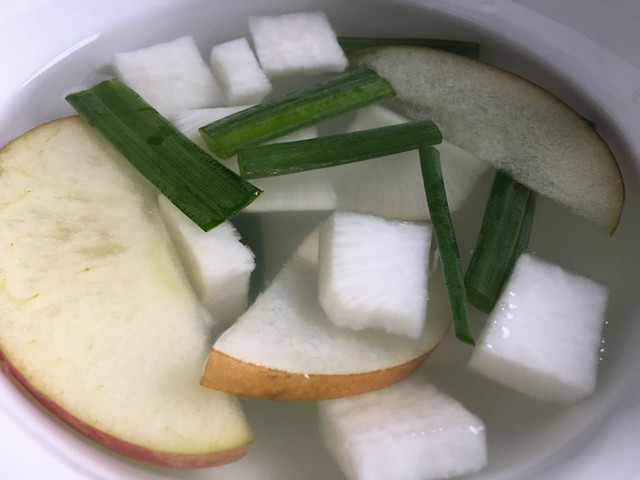You are here
How to Make Mool Kim Chi
If you appreciate the flavor and health-enhancing properties of traditionally made kim chi, you may also find mool kim chi worth trying. Literally meaning "water kim chi," mool kim chi has long been loved in Korean culture as a cool and refreshing side bowl of brine and fermented radish slices - if you haven't experienced it, you might think of it as a Korean version of Kombucha crossed with kim chi.
Mool kim chi happens to be rich with many of the properties of cold, flu, and sore throat tonics, so beyond the refreshing flavour and probiotics, it's an excellent prophylactic during cold and flu season.
There are many variations of mool kim chi, as many as there are types of kim chi. Here's a look at a version I like to make with Daikon radish, Fuji apple, and Asian pear slices:
The quantities listed below make approximately 64 ounces or just less than 2 liters of mool kim chi.
Ingredients:
1 small Daikon radish, skin removed, chopped into 1/4 to 1/8-inch bite-size pieces
1 bunch of green onions, chopped into 1-inch pieces
1/2 Fuji apple, chopped into 1/8-inch slices
1/2 Asian pear (crispy), chopped into 1/8-inch slices
2 pieces of ginger, about 2 inches long each, skin removed
1/2 yellow onion
6 cloves of garlic, left whole
3 small hot red peppers, green stems cut off but otherwise left whole
2 tablespoons of sea salt
64 ounces of cold water
Directions:
1. Wash all vegetables well and chop into the sizes indicated in the ingredients list above.
2. Add all solid ingredients to a jar that you have a tight-fitting lid for. If you need to use two or more jars, split the ingredients equally between your jars.
3. Dissolve 2 tablespoons of sea salt in cold water, then add your salt water to the jar(s) of vegetables and fruits.
4. Secure lids on jars and store on your kitchen counter for 24 to 48 hours or until you see a little bubbling of the brine - at this point, transfer your mool kim chi into the refrigerator and ladle out portions as needed, served cold.
Please note that just a small bowl - 4 ounces or so - goes a long way, and most Koreans only ingest the brine, radish, pear and apple - the other ingredients remain in the jar to continue to contribute flavor and nutrient-value. Most have mool kim chi along with a meal, though some have it as an appetizer or even as a palate cleanser toward the end of a meal.
If you prefer more heat and colour to your mool kim chi, chop the hot red peppers into small pieces before adding the salt water.
For the recipe without photos for printing, please go here:
Join more than 80,000 readers worldwide who receive Dr. Ben Kim's free newsletter
Receive simple suggestions to measurably improve your health and mobility, plus alerts on specials and giveaways at our catalogue
Please Rate This
Highest Rated | Related Posts | ||
















Comments
Fermenting Time
Is this fermenting time sufficient for a good probiotic?
Can it be increased; how much?
Thanks!
Kimchi
Thank you, as usual, for the wonderful articles and recipes. When I lived
up North I would venture to H-Mart and get so many wonderful vegetables in
the produce section. I need to become a snowbird and for a few months every
year go somewhere cooler and enjoy the benefits of that store again. Here in
Florida (and even in Georgia) there are no H-marts. Cheers.